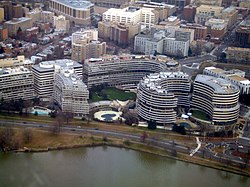This article needs additional citations for verification. (November 2011) |
| Watergate scandal |
|---|
 |
| Events |
| People |
The Watergate Babies were Democrats first elected to the United States Congress in the 1974 elections, after President Richard Nixon's resignation over the Watergate scandal, on August 9, 1974.[1][2]
Democrats picked up 49 seats in the House and 5 in the Senate. This group greatly increased the strength of Northerners and liberals in the House Democratic Caucus. They joined more senior liberals to strike a blow against the seniority system and overthrow three committee chairmen whom they viewed as too conservative and/or too old to represent the caucus: William R. Poage (D-TX), Wright Patman (D-TX), and F. Edward Hébert (D-LA).
Thomas Downey of New York was the youngest among the "babies", aged 25 upon his election, the minimum age at which one may serve in the U.S. House of Representatives. Senators Patrick Leahy (D-VT), Chris Dodd (D-CT), Tom Harkin (D-IA), Paul Simon (D-IL), Paul Tsongas (D-MA), Max Baucus (D-MT), and Bob Krueger (D-TX) were also elected during this cycle. Leahy was the last Watergate Baby to serve in Congress; he retired in 2023 after 48 years in office.[3]
"Watergate Babies" can also apply to those Democrats elected to state or local office in 1974;[4][5] political scientist Malcolm Jewell wrote, "Democrats made substantial state legislative gains in a large number of states in 1974, the Watergate election".[6] Numerous states passed sweeping ethics and public disclosure reforms in the aftermath of Watergate.[7][8]
"Watergate Babies" has also been used to apply to journalists who entered the field because of Watergate.[9] "Watergate," David Baumann wrote,[10] "also created a generation of journalists who were not willing to accept politicians at their word. If the journalists who helped uncover the scandal, Bob Woodward and Carl Bernstein, could expose the crimes of a president, then certainly there were crooked politicians elsewhere. Those journalists believed in investigative reporting and became watchdogs who attempted to keep politicians honest.[11]
- ^ Balz, Dan (10 August 1980). "Democrats: Off Track To Some". Washington Post. Retrieved 6 March 2018.
- ^ Sullivan, Joseph F. (September 14, 1980). "Maguire Faces Rerun Of Tight '78 Race". The New York Times. p. 46. Archived from the original on February 22, 2014. Retrieved July 5, 2012.
- ^ Finn, Teaganne; Fulton, Jacob (November 15, 2021). "Sen. Patrick Leahy announces he won't run for re-election". NBC News. Retrieved August 11, 2022.
- ^ Liu, Irene Jay (December 14, 2009). "A 70's flashback at Capitol". timesunion.com.
- ^ "The last of the Watergate babies". Democrat and Chronicle. April 2, 2007. Archived from the original on June 28, 2013. Retrieved April 28, 2013.
- ^ Jewell, Malcolm Edwin (1982). American State Political Parties and Elections. p. 228. ISBN 978-0256026627.
- ^ STATE GOVERNMENT, Volumes 65-66 (1992), page 35
- ^ Hrenebar, Ronald J.; Thomas, Clive G. (May 2004). Interest Group Politics in the Northeastern States. p. 369. ISBN 978-0-271-02576-6.
- ^ Taylor, Madison (May 17, 2013). "Confessions of a Watergate baby". Times-News.
- ^ Baumann, David (June 18, 2011). "The Legacy of Watergate". About.com US Politics. Archived from the original on May 13, 2013. Retrieved July 5, 2013.
- ^ Cite error: The named reference
2018 Politico articlewas invoked but never defined (see the help page).